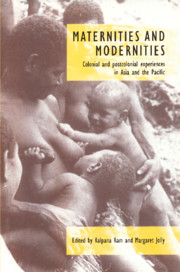Book contents
- Frontmatter
- Contents
- List of illustrations
- Notes on contributor
- Acknowledgements
- Map 1 Location of countries and regions in Asia and the Pacific discussed in this volume
- Introduction Colonial and postcolonial plots in histories of maternities and modernities
- 1 Shaping reproduction: maternity in early twentieth-century Malaya
- 2 Modernizing the Malay mother
- 3 ‘Good wives and mothers’ or ‘dedicated workers’? Contradictions of domesticity in the ‘mission of sisterhood’, Travancore, south India
- 4 Maternity and the story of enlightenment in the colonies: Tamil coastal women, south India
- 5 The dai and the doctor: discourses on women's reproductive health in rural Bangladesh
- 6 Other mothers: maternal ‘insouciance’ and the depopulation debate in Fiji and Vanuatu, 1890–1930
- 7 Just add water: remaking women through childbirth, Anganen, Southern Highlands, Papua New Guinea
- 8 From sisters to wives: changing contexts of maternity on Simbo, Western Solomon Islands
- Epilogue Maternal experience and feminist body politics: Asian and Pacific perspectives
- Index
2 - Modernizing the Malay mother
Published online by Cambridge University Press: 06 July 2010
- Frontmatter
- Contents
- List of illustrations
- Notes on contributor
- Acknowledgements
- Map 1 Location of countries and regions in Asia and the Pacific discussed in this volume
- Introduction Colonial and postcolonial plots in histories of maternities and modernities
- 1 Shaping reproduction: maternity in early twentieth-century Malaya
- 2 Modernizing the Malay mother
- 3 ‘Good wives and mothers’ or ‘dedicated workers’? Contradictions of domesticity in the ‘mission of sisterhood’, Travancore, south India
- 4 Maternity and the story of enlightenment in the colonies: Tamil coastal women, south India
- 5 The dai and the doctor: discourses on women's reproductive health in rural Bangladesh
- 6 Other mothers: maternal ‘insouciance’ and the depopulation debate in Fiji and Vanuatu, 1890–1930
- 7 Just add water: remaking women through childbirth, Anganen, Southern Highlands, Papua New Guinea
- 8 From sisters to wives: changing contexts of maternity on Simbo, Western Solomon Islands
- Epilogue Maternal experience and feminist body politics: Asian and Pacific perspectives
- Index
Summary
This chapter looks at the modernizing of mothering in Malaysia, exploring the successive imaginaries of the ‘mother’ in both scholarly and political cultural production in the country, especially in the post-Independence, nation-building period. But as I shall argue, a series of uncertainties pervades any discussion of gender, women and mothering within Malaysian ‘modernity’. To work on these issues in the context of my research, first in rural and then urban Malaysia, has inevitably enmeshed me in a series of modern scholarly insecurities; these include furious debates about positionalities, the decentring of liberal humanist ideas and the scepticism of many ‘Third World’ scholars and activists about Western anthropological claims to know about and speak for its objects located beyond Euro-America.
Exploring Malay mothering
To examine ‘modern’ mothering in Malaysia, we need first to attend to the particularities of modernity in the country. As I suggest elsewhere (1994b, n.d.b), imported Eurocentric models of ‘modernization’ project ideas deriving from Western social developments directly on to analyses of Malaysia. I argue that we cannot unproblematically apply to Malaysia assumptions about a standard linear progression from ‘tradition’ to the rationalization, bureaucratization, industrialization and secularism of mainstream Western models of modernity; this is to ignore both the specificities of the development process in the country and the problems within contemporary social theory with the increasingly unstable category of modernity itself.
- Type
- Chapter
- Information
- Maternities and ModernitiesColonial and Postcolonial Experiences in Asia and the Pacific, pp. 50 - 80Publisher: Cambridge University PressPrint publication year: 1998
- 10
- Cited by



